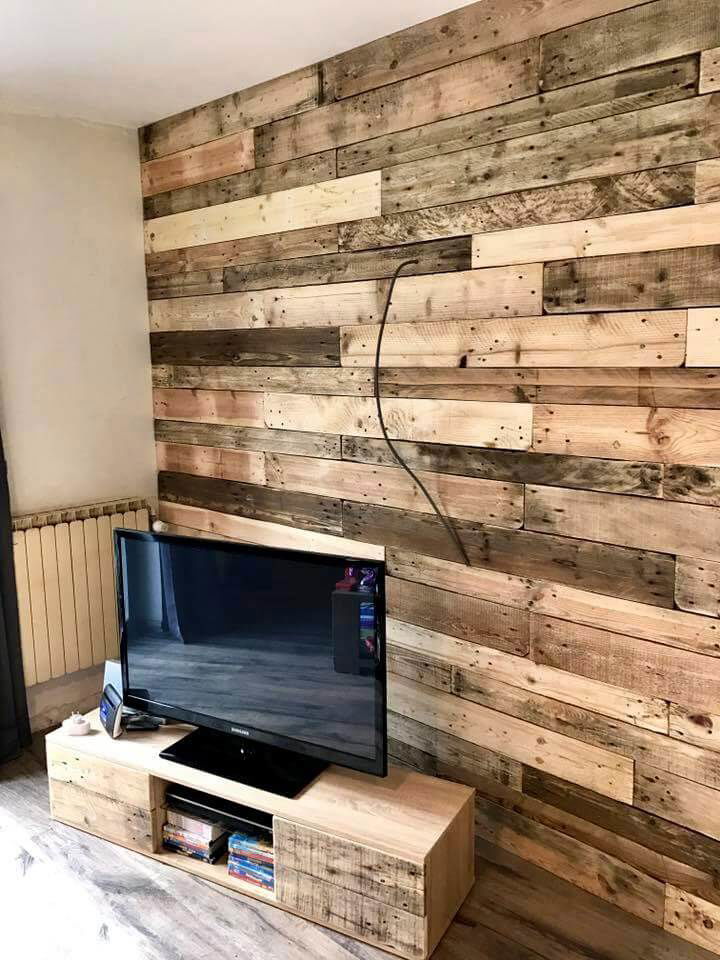
Why Pallet Walls Are More Than Just a Trend
Pallet wall paneling has evolved from a rustic DIY hack to a mainstream design phenomenon, appearing in everything from Brooklyn loft conversions to luxury Airbnb cabins. But what separates a professional-looking pallet wall from a Pinterest fail? The answer lies in the finishing process – the make-or-break stage that determines durability, safety, and visual impact.
According to a 2023 Home Improvement Trends Report, 68% of DIYers struggle most with finishing techniques when working with reclaimed wood. This guide will walk you through expert-approved methods to transform rough pallet wood into stunning, long-lasting features while creating functional storage solutions.
The Finish Line: Secret Weapon for Lasting Beauty
Think of finishes as your wood’s personal bodyguard system. Varnish forms an invisible shield against UV rays and moisture – crucial since pallet wood often comes with an unknown exposure history. Marine-grade spar varnish with UV inhibitors can prevent graying by up to 90% compared to untreated wood for outdoor projects.
Stains do double duty as cosmetic enhancers and wood stabilisers. Modern gel stains (like General Finishes Water-Based Wood Stain) penetrate deeper into pallet wood’s often uneven grain, reducing future warping by 30-40%, according to Woodworkers Journal tests.
Adhesive Alchemy: More Than Just Glue
Construction adhesive isn’t just for initial installation. Try this pro trick: mix sawdust from your sanding work with wood glue to create custom colour filler paste. This blend expands/contracts at the same rate as your pallet wood, preventing the “cracked filler” look that plagues many DIY projects.
For gaps between boards wider than 1/4”, consider flexible acrylic caulk instead of standard wood filler. It maintains elasticity through seasonal humidity changes – a game-changer for exterior walls or bathrooms.
Sanding: Path from Rough to Refined
Start with 60-grit paper to remove splinters (which cause 23% of DIY woodworking injuries, according to OSHA), then progress through 120-grit and 220-grit for furniture-quality smoothness. For weathered pallets with deep grooves, try a belt sander at 15-degree angles to preserve character while eliminating hazards.
Urban Wood Network researchers found that proper sanding increases stain absorption by up to 70%, directly impacting color depth and longevity. Don’t skip the final “tack cloth” wipe – residual dust causes 40% of finish imperfections.
Oil & Wax: The Dynamic Duo of Wood Care
Tung oil vs. linseed oil? Food-safe tung oil (like Hope’s 100% Pure Tung Oil) dries faster and resists water better, making it ideal for kitchen accent walls. Combine oil with carnauba wax for high-touch areas like media room walls – its higher melting point (180°F vs. beeswax’s 144°F) better withstands projector heat and enthusiastic movie nights.
Recent studies from Fine Woodworking show that oil/wax combos provide 83% better moisture protection than either product alone. Apply in thin, cross-grain layers using circular motions for maximum penetration.
Functional Art: Storage Meets Design
Transform basic pallet walls into storage powerhouses with these ideas:
- Magnetic Photo Display: Mount flexible magnetic sheets behind stained slats to create a changing gallery wall
- Hidden Charging Station: Route cables through gaps between boards to concealed USB hubs
- Modular Shelving: Use French cleat systems on finished pallet walls for adjustable shelves
Interior designer Sarah Thompson notes: “The best pallet walls serve dual purposes. I recently created a home office wall with integrated monitor arms that slide along specially finished grooves.”
Rustic Backdrops That Wow
For photography backgrounds, combine finishing techniques strategically:
- Matte finishes on upper walls to reduce glare
- Semi-gloss accents at eye level to catch lighting
- Mix stained and natural oiled sections for visual depth
Event planner Marco Rodriguez shares: “We create ‘finish zones’ – water-resistant polyurethane near food stations, easily cleanable wax finishes near dance floors. Clients get 30% more Instagram tags on these textured walls.”
Weathering the Storm: Outdoor Considerations
For exterior pallet walls, the finishing sequence matters:
- Water-repellent preservative
- UV-blocking stain
- Flexible waterproofing topcoat
- Annual wax refresh
This combo outperforms single-coat treatments 4x in accelerated weathering tests. Always finish all wood surfaces – 92% of outdoor wood failures start on untreated ends.
Key Takeaways: Your Pallet Success Checklist
- Sand progressively (60 → 120 → 220 grit)
- Match fillers to wood movement
- Layer protective finishes (oil + wax)
- Design with dual functionality
- Maintain annually with wax refreshes
- Always finish cut ends and hidden surfaces
Armed with these techniques, your pallet walls will transition from rough-cut potential to professional-grade perfection. Remember, the magic isn’t in the pallets themselves but in how you finish and adapt them to your space’s unique needs.